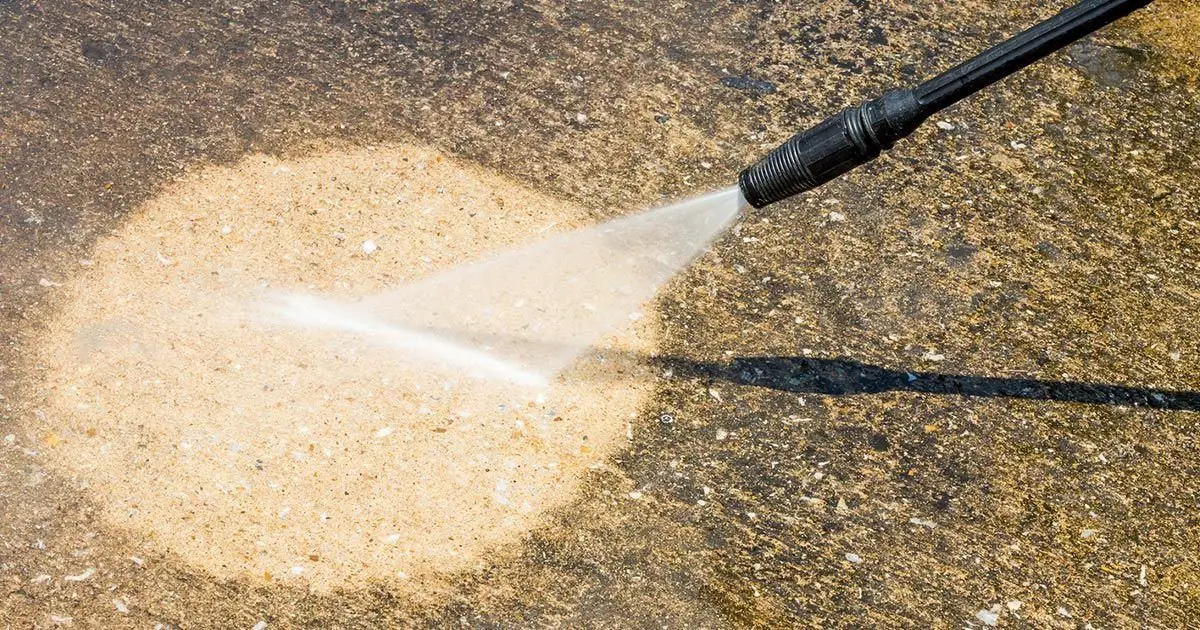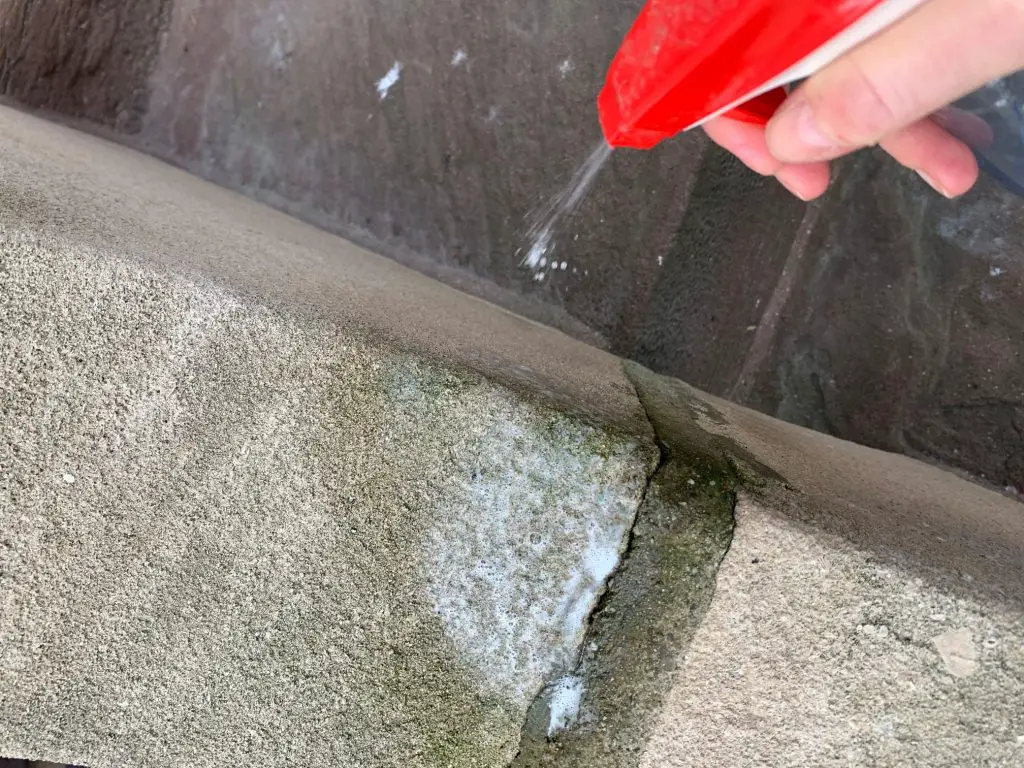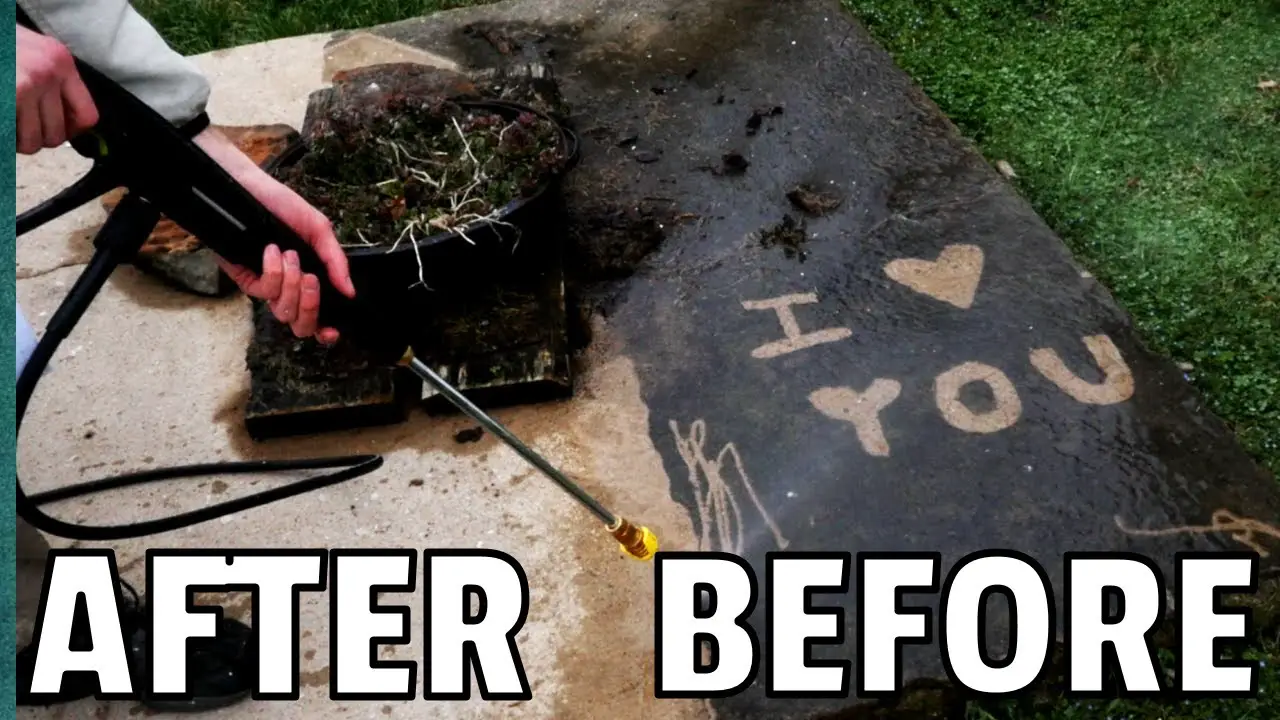General Cleaning For Dirty Cement
Before you begin cleaning cement stains, general cleaning of the entire surface.
Of Hard Deposits On Inside Of Concrete Blocks It’s Only On The Lower 1
This is a tricky one. If its hard to the touch, its not mold. Its either mortar or efflorescence. The latter will dissolve in water. Typically its powdery, but Ive seen it form hard, crystal like deposits in some cases. The fact you found mold on the backside of the sheet rock points to an ongoing moisture intrusion. This would explain the efflorescence, which occur when moisture moves through masonry. I recommend testing the deposits by submersing them in water. Do not reinstall the sheet rock until youve dealt with the underlying moisture issue.
Grease And Oil Stains
To clean oil from concrete, sprinkle sawdust, cornmeal, or baking soda directly onto the stain to absorb as much of the spill as possible. Once the spill is absorbed, brush away the remaining powder with a broom.
If a stain remains, sprinkle more baking soda and scrub the stain with a nylon brush and a little bit of water. Not all is lost if the oil stain is old or has penetrated the surface to help remove residual grease stains, try a degreaser and follow the manufacturers instructions.
Read Also: How To Remove Mold In Basement
How To Get Rid Of Mold On Concrete Basement Walls And Floor
When mold is found in the interior of a home, its a much bigger deal because of the serious health hazards of black mold. For more extensive interior mold problems, it may be best to hire a professional mold mitigation service for removal.
If thats not in the budget or youve discovered the problem while its still relatively small, you can do it yourself.
Begin by protecting yourself. Because mold can affect the respiratory system, its best to use a high-quality respirator to block out mold spores. Also, use rubber gloves and goggles for eye protection.
Create either a bleach solution or a solution of detergent and water. The Environmental Protection Agency suggests the latter as detergent can better penetrate concretes porous surface than bleach.
For thorough cleaning, use trisodium phosphate, an industrial-grade detergent that will kill mold and remove grease and grime. Apply the cleaner with a brush and scrub thoroughly to remove the mold and engage the roots. Wipe clean.
Once clean, use a bleach or vinegar solution and allow the solution to dry on the wall or floor. This will serve as a preventative to keep the mold from returning.
What To Know Before You Start

Cleaning a stained cement or concrete floor isnt a quick task, but its not a difficult one, either. Before you get started, there are a couple of important things to remember:
1. Do not mix cleaning methods. Combining different solvents can cause toxic fumes and lead to serious health problems. Treat each kind of stain one at a time and give the floor enough time to thoroughly dry between methods.
2. Use good ventilation. If youre working in the garage, open the doors. If youre working indoors, open windows. Youll be stirring up a lot of dust and possibly other irritants that have soaked into the cement. Protect your lungs. If you have asthma or allergies, its a good idea to wear a particulate respirator mask, too.
Read Also: How To Kill Basement Mold
How To Clean Mold On Outdoor Concrete
Cleaning and disinfecting mold-covered concrete is a fairly simple process and there are a few ways to do it. Cleaning outdoor concrete is the simplest because you can use a garden hose to finish the job. Create a cleaning solutions and pour it on the surface. Scrub and clean in a circular motion to clean like an expert. Spray down to finish the job. Voilà, all mold removed. Follow our detailed 4 steps removal guide below for the best result and lasting effect.
- Step 1: Create a cleaning solutionTo begin youll need to create a cleaning solution thats effective at black mold removal. Use a bucket to mix one-half cup of bleach diluted with one gallon on water. This amount of solution can treat an area about five square feet. If you need to clean a larger area simply double the solution.
- Step 2: Pour and waitSimply pour the bleach solution onto the entire affected area and allow it to set for about fifteen minutes. This gives the bleach time to kill the black mould completely.
- Step 3: Tedious for the bestNow make a more concentrated solution with one cup of bleach with one gallon of water. Use a wire scrub brush to scrub the concrete in a circular motion. Although a bit tedious, this will make sure the mildew is completely removed from the surface of the concrete.
- Step 4: Spray down to finish the jobFrom here you simply use a hose to spray down the affected area, removing the cleaning solution from the surface.
Remove Mold From Drywall/painted Walls
Mold can often grow on drywall and painted interior walls, especially in areas where moisture and humidity are a factor, such as kitchens and bathrooms. Walls can also be affected if your roof or exterior walls are infiltrated by water. If the drywall remains wet, mold can begin to grow and penetrate the drywall throughout. When this happens, the drywall must be removed and replaced, as you will not be able to get rid of all mold under these circumstances.
Recommended Reading: How To Remove Mold From Basement
What Is The Best Way To Clean Concrete
Mix 1/2 cup baking soda to one gallon of water for a gentle cleaning solution. Add 1/8 cup of liquid dish detergent. Spray on patio surface, let sit for 30 minutes, then scrub and rinse. For heavily stained or mildewed patios, you may need a pressure washer.
How To Remove Mold From A Concrete Patio
- Written by Cameron Sherber on Jun 29, 2010To ensure our content is always up-to-date with current information, best practices, and professional advice, articles are routinely reviewed by industry experts with years of hands-on experience.Reviewed by
If your concrete patio has recently fallen victim to mold, it is important to take steps to get rid of it. Mold growth is unsanitary and it destroys the look of an otherwise beautiful patio. Follow the few simple steps below to quickly get yours mold-free.
Step 1 – Clean First
You will need to give your patio a thorough cleaning before proceeding to remove the mold. Begin by using a vacuum cleaner to remove any caked-on dust deposits, making sure to use a mini vac or feather duster to remove any from crevices or difficult-to-reach areas. You can also use a wet/dry vac in lieu of a vacuum cleaner, as these devices typically work well with concrete surfaces.
Once the dust has been purged from your patio, produce a homemade cleaning solution of mild liquid soap and warm water. Apply it and allow it to set in for several minutes before you give the patio a vigorous scrubbing with a hard-bristled scrub brush. Should you encounter any exceptionally stubborn stains, try using a wire brush instead. Follow up the cleaning by using a garden hose to rinse away any remaining traces of your homemade solution.
Step 2 – Apply Your Bleach Solution
Step 3 – Apply Your Finishing Touches
Also Check: How To Remove Mildew From Ceiling In Bathroom
Is It Okay To Put Bleach On Concrete
Concrete is prone to dirt, stains, molds, and mildew. Yes, you can make use of the bleach to clean the affected concreted area in your home. Bleach will not only remove the stains and dirt from the concrete, but it will also deodorize and kill the mold and mildew if used properly. However, there are a few things you need to know first about cleaning the concrete with bleach.
The type of bleach to be used also matters. Pure household bleach followed by an adequate hot water rinse causes no harm to your concrete. Use chlorine bleach to kill the mold spores and remove the stains effectively. Oxygen-based bleach will only remove the stains but not kill the spores.
Also, if your concrete is colored, the bleach might affect it. Fancy colored concrete should not be handled like the basic garage concrete floor. The harsh ammonia bleach endorsed for concrete cleaning will only ruin the color and sealant on this type of concrete. Whats more?
In case there are plants, furniture on the patio, or along with the steps, you need to remove or cover them as bleach will damage or discolor them.
My Basement Wall Has Developed This In Recent Months This Is A Shared Wall Of A Twin Home But This Part Of The Wall Extends Past The Neighbor’s House And I Believe There Is Water Sitting On The Side Of The House Is This Mold
This is likely a combination of mold and efflorescence. Efflorescence occurs when moisture migrates through the concrete, picking up minerals along the way. Once the moisture reaches the surface, the water evaporates, leaving behind the mineral deposits. Because this is a product of water movement, often a small amount of mold growth is present as well. If the concrete wall is unfinished/uncovered, it will typically dry out on its own. However, youll need to fix the issue if you plan on finishing out this wall with framing, insulation, etc. The wall will inhibit dry out and lead to mold and rot damage to the framing.
Preventing moisture migration through a concrete foundation wall is accomplished by a combination of the following. 1.) redirecting downspouts away from the home. 2.) Installing a waterproof membrane on the interior side of the foundation wall. 3.) Installing an interior footing drain and sump pump at the base of the foundation wall.
You May Like: How To Get Rid Of Mold In Bathroom Ceiling
How Often To Clean Cement Areas
Cleaning your outdoor areas is a year-round task. Sweep cement patios, steps, and sidewalks weekly during warm weather and at least once a month during winter. Sweep your garage at least once a month, too. Clean spills on concrete when you see them and use fans to dry indoor cement areas any time they get wet. Routine cleaning of cement and concrete areas is ultimately the easiest way to prevent stains.
I Found A Hard Black Coating Under Painted Concrete In My Basement If After Cleaning Can I Paint Over It It Did Not All Scrub Up Does Mold Get Imbedded In The Cement

Based on your description, this does not sound like mold. On concrete, mold will appear in either a fuzzy format or a stain like appearance. It would not feel like a hard coating. In either scenario, it is fine to paint the concrete after youve thoroughly scrubbed and cleaned the area. Anything remaining is simply the pigment from the prior mold growth, which cannot regrow.
Also Check: Clean Bathroom Ceiling
General Maintenance Of Concrete Floors
Concrete floors should be cleaned at least once a year to keep them in tip-top shape. Before starting, remove any items from the areaif its an outdoor patio, remove all potted plants, furniture, and decorative items. Do a spot test by testing your cleaner in an inconspicuous area to ensure your method will not cause any additional discoloration or damage to your concrete.
To clean a concrete floor in your basement, you may need to do it in sections by moving everything from one side of the room to the other, and then switching back to finish the job.
Inspect your floors for cracks or chips and make any necessary repairs before beginning the cleaning process.
How To Remove Mold From Walls
Mold on your interior walls doesnt just look unpleasant it can be a health hazard for your family. Depending on the amount and location, its presence also suggests a larger problem in your housewater infiltration.
For this project, we will focus on solving the mold problem. The remedy is two-fold: 1. Control moisture and 2. Kill the mold. While the former may take a more involved approach, depending on the situation, the latter often can be done with some bleach, water and a bit of elbow grease.
You May Like: How To Clean Bathroom Mold On Ceiling
What Causes Mold To Grow On The Patio
Mold loves warm and damp areas. If your yard has a lot of moisture, standing water and a lot of warm and dark areas, then you most probably are going to find mold growing and thriving.
Once mold settles outside your home, it can grow on nearly anything including sheetrock, wood, and paint. To make matters worse, if you live in an area where there are ongoing moisture and warm conditions, then your mold will have an ideal and highly conducive environment.
Lots of landscapes have been ruined by mold that has gottenout of hand. However, a more pressing issue is the spores that pose a healthhazard. If you notice mold in your backyard, get rid of it as soon as you can.
So all mold really needs to grow is a warm and dampenvironment. So if your concrete patio tends to hold a lot of water or standingwater when it rains and if it doesnt get any sunlight, then its probablygoing to attract a lot of mold and mildew and various other types of fungi.
We Just Purchased Our Home Three Months Ago And Recently We Discovered These Discolored Areas In Our Garage Should We Be Worried Should We Be Seeking Some Type Of Environmental Remediation
Its difficult to determine from the photo whether this is mold or efflorescence. An easy way to distinguish between the two is by flicking a bit of water on the surface. Efflorescence will dissolve in water, mold will just mat down a bit.
Either way, it likely indicates vapor emissions moving through the concrete. You can verify this by taping a piece of plastic to the concrete. Recheck this in a few days. If you find condensation on the backside of the plastic, you have a vapor emissions issue.
In a garage this is not a problem, as long as you keep sensitive items off the floor. The vapor will eventually evaporate from the surface. Do not install carpeting on any concrete showing signs of vapor emissions! This will lead to major mold problems.
You May Like: Water Filter Mold
How To Clean Black Mold From Pavers
Mold can appear everywhere, from fruits to pavers. They are probably every homeowners nightmare and not only causes aesthetic problems but also health issues, once it can cause a variety of symptoms, like shortness of breath, aggravated asthma, sinus congestion, coughing, itchy eyes, allergies, etc.
If you have black mold growing on your pavers the best thing can do is give them a good cleaning to remove the mold and make sure it stays away from them for a long time.
In this article, youre gonna learn everything you need about cleaning and removing black mold from pavers properly and safely in a step-by-step guide!
Gather Equipment And Prep For Safety
First, you want to gather your cleaning tools and safety equipment.
Mold can trigger asthma and other allergic reactions in people who are sensitive to mold. For those people, it is best to avoid this activity.
Safety EquipmentFor safety equipment, you want to have gloves, a dust mask rated N95, and safety glasses.
If youre dealing with lots of mold, you will also want a Tyvex suit to protect the mold spores from getting on your clothes.
What Youll Need To Clean Mold
You have several options when it comes to what to use to sanitize the mold.
Hydrogen peroxide or OxiClean will work for generic cleanups. Scrub with a scrub brush.
If you want a deep clean, you can use what the professionals use. RMR-86 is a no-scrub formula.
For large moldy areas, you can use the 2.5 gallon size with a garden pump sprayer or professional spray bottle.
Read Also: How To Get Rid Of Mold On Bathroom Ceiling
What Is Black Mold
Black mold is often found inside houses with excessive moisture damage to wallboard and other surfaces. Much is made of this type of molds toxicity but the mold itself isnt harmful. It does however have the potential to produce mycotoxins that can cause harm to people and pets, depending on the particular species of mold. A rule of thumb should be use caution when removing all molds, especially when in abundance.
Is Mold On Concrete Patio Dangerous

Mold are usually dangerous when they grow anywhere in your home. Other than harming your family members, your pets are also not spared. A patio infested by fungus will make the bricks, pavers or concrete to appear stained. Mold is one of the reasons for black spots on your concrete patio or driveway.
Removing mold on patio before it matures or spread is very important. Cleaning a large section of mold requires the help of a professional. This can be an expense, and doing it yourself is a way of endangering your health.
Read Also: Remove Mold From Ceiling In Bathroom
